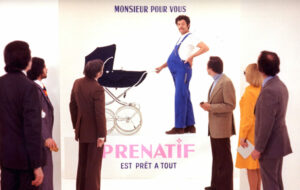In the series Jazz in the Film, episode 343: Michel Legrand (20).
1. Peau d’Âne (1970).
Anne Germain, Jacques Revaux, Christiane Legrand & Delphine Seyrig, vocals.
Studio Orchestra conducted by Michel Legrand.
2. The Most Important Event Since Man Walked on the Moon (1973).
Studio Orchestra conducted by Michel Legrand.

Michel Legrand (1932-2019), episode 20.
Michel Legrand met director Jacques Demy in 1961. He was asked on short notice to compose a song for a film that had already been shot: Lola. The previously hired composer was Quincy Jones, but he had no more time. In the scene in question, Anouk Aimée is seen – without sound – reciting a text by Agnès Varda as if she were singing. Legrand had to come up with a melody that precisely matched the movements of her mouth.
After a day of trying, he succeeded. Then Jacques Demy had found his composer for life. Since 1961, they have worked together, with the most famous example being the film operetta Les Parapluies de Cherbourg from 1967. ‘Jazz in the Film’ has already paid attention to this several times.
In 1970, they further developed the concept of a partially sung film. That film, Peau d’Âne, even more resembles an operetta, as the screenplay is an adaptation of Charles Perrault’s seventeenth-century fairy tale ‘Donkeyskin’.
Legrand therefore weaves baroque schemes into his score.
But above all, it had to be a modern story; director Demy had just returned from California, where he had become acquainted with pop art and hippie culture. That’s why he wanted Legrand to orchestrate the classical fugues with electric guitars and jazz rhythms.
The singing parts of the actors were dubbed by professional singers, just like in Les Demoiselles de Rochefort in 1967. Legrand had a lot of freedom, because for the first time in his career he was dealing with a subject from the world of fantasy. His score moves from the search for love (through the song ‘Amour, Amour’) to the recipe for a love cake: the song ‘Recette pour un Cake d’Amour’. Both songs became hits in France, just like the film itself.
This can be seen as indicative of the free morality of 1970, because in the fairy tale, remarkable things happen between the search for love and finding it. A king wants to have a male heir, even after the sudden death of his wife, by marrying his own daughter. But this princess gets advice from her fairy godmother, the Lily Fairy, to flee the palace. For this, she dresses up in the fur of a donkey: “peau d’âne” in good French. Before it was skinned, it was a magical donkey that produced gold and jewels for the king. Only outside the castle in the forest can the princess meet “Prince Charming,” and so they lived happily ever after.
You hear singing by Anne Germain for Catherine Deneuve as the blue princess, by Jacques Revaux for the charming prince played by Jacques Perrin, and by Legrand’s sister Christiane for the fairy, a role played by Delphine Seyrig.
Delphine Seyrich was very disappointed that she was not allowed to sing her role herself. The demo recording of her singing audition has been preserved. This is the song in which the fairy gives good advice to the princess: ‘Conseil de la Fée des Lilas’. With this, we conclude the soundtrack of Peau d’Âne.
In 1970, Michel Legrand of course conducted the studio orchestra and singers himself.
Jacques Demy called Michel Legrand his kindred spirit. This also meant that they could tell each other the unvarnished truth. After Peau d’Âne, they did not always agree with each other; sometimes Demy turned to other composers for projects. Legrand noted in interviews after Demy’s death in 1990 that Peau d’Âne marked the end of his grandiose song and dance spectacles; they no longer fit in with the present time. Funding could only be found for smaller productions.
Director and composer made the modest comedy L’Événement le Plus Important depuis que l’Homme a Marché sur la Lune three years after Peau d’Âne. In this film, Jacques Demy does indeed lose touch with reality a bit: his script is about a driving school owner in Paris, played by Marcello Mastroianni, who shows up with stomach pain at his doctor’s office. He turns out to be four months pregnant. This can rightfully be called the most important event since man walked on the moon, as the long title of the film reveals. Fortunately, the man is supported by his understanding wife, played by Catherine Deneuve.
Michel Legrand keeps it cheerful, using an accordion to indicate the Parisian setting, and elegant, if not feminine, waltzes, whether as pastiches of early Parisian salon music or not.
For L’Événement le Plus Important depuis que l’Homme a Marché sur la Lune, the composer conducted a studio orchestra in 1973.
Kees Hogenbirk








